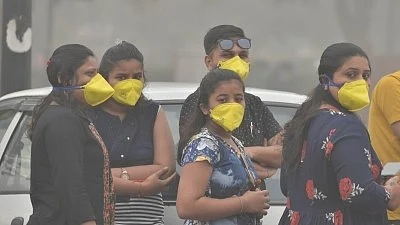Last week, a survey conducted by LocalCircles stated that at least one member in every four out of five families in Delhi NCR is reeling under the health impacts of the increasing air pollution in the region.
Speaking to FIT, doctors in hospitals in Delhi-NCR talk about the situation in the OPDs as AQI levels in the region remain dangerously high – and it's not a pretty picture.
They report that cases of upper respiratory infections, and asthma have gone up, and so have ICU admissions. Here's what they said.
Post-Diwali Respiratory Issues: Now A Pattern
Dr Manoj Kumar Goel, the director of pulmonology at Gurugram’s Fortis Memorial Research Institute, says that the number of patients with respiratory issues increases significantly post-Diwali every year, especially after the stubble burning season begins.
He adds that in a lot of patients with a history of asthma, the condition worsens every winter season, when the pollution increases.
Dr Goel goes on to say that there isn't just an increase in the number of patients who are consulting doctors, but also in patients with severe symptoms who are being hospitalised.
"These cases are directly linked to pollution. Every year we hope that the pollution will be brought under control, but this is now a pattern."Dr Manoj Kumar Goel, director, pulmonology, Fortis Memorial Research Institute, Gurugram’s
Dr Karan Madan, a pulmonologist at AIIMS Delhi, also told FIT that the hospital has been seeing a rise in patients who are being hospitalised with upper respiratory issues and asthma.
Dr Manish Garg, a consultant pulmonologist at BLK-Max Super Specialty Hospital says something along the same lines, adding, "the higher levels of air pollution irritate airways, worsen lung function, and aggravate symptoms or even lead to hospitalisations in patients with diseases such as asthma and chronic obstructive pulmonary disease (COPD)."
What Are the Main Health Issues Challenging the People of Delhi NCR Right Now?
Dr Goel shares that the kind of cases coming in are ranging from severe cough and chest infection, to fungal atypical infections, pneumonia, and asthma.
“Around 50 percent of the patients, who are coming to us with severe respiratory distress, are going to the ICU because of low oxygen levels and high carbon dioxide levels.”Dr Manoj Kumar Goel, the director of pulmonology at Gurugram’s Fortis Memorial Research Institute
Dr Viny Kantroo, a Respiratory, Critical Care, and Sleep Medicine Consultant at Delhi’s Indraprastha Apollo Hospitals says that due to pollution, cases of wheezing bronchitis are also increasing.
She adds that breathlessness, increased cough, and increased phlegm production are also being seen in lots of patients, especially in people whose asthma has been triggered by pollution.
With viral infections affecting people as well, these symptoms linger around well till the end of January or the beginning of February, says Dr Goel.
Who Is at the Most Risk?
While pollution affects people of all age groups, elderly people, children, smokers, and those with comorbidities (such as heart diseases or respiratory issues) are at the most risk.
Dr Kantroo explains that pollution increases the risk of viral fevers also because the cold air stays at the ground level for longer, and viruses thrive in such an environment. Thus, people with low immunity contract severe diseases.
What Do Doctors Advise?
Not everyone can choose to leave the city during these months when the air quality is at its worst, and not everyone can afford an air purifier.
However, speaking of ways to protect yourself from the harms of air pollution the doctors we spoke to advise,
Minimise outdoor activities
Children and elderly people should avoid going out unnecessarily
Avoid running and jogging
Try indoor exercises like yoga
Work from home if possible
Drink warm water
Eat green vegetables and fruits
Wear masks
Avoid overcrowded places
Consult a doctor and take prescribed medicines if you’re facing respiratory issues or have trouble breathing
Avoid early morning and late evening colder air
If absolutely necessary, go out during the afternoon when there is sunlight
Cut back on smoking
If affordable, use an air purifier at home
Try to increase greenery around your home
Dr Goel also says that the pollution-induced cough sometimes does not respond to the usual cough medications.
In that case, doctors might recommend using a pump or inhaler temporarily, which are patient-friendly and not something that patients should be scared of.
Dr Madan agrees. He too shares that he’s been prescribing a lot more inhalers now than he normally does.
Dr Garg adds that in case you want to go a step further,
"You can even actively monitor your lung health with the help of a peak flow monitor as an extra added layer of precaution to manage your condition more effectively."Dr Manish Garg, consultant pulmonologist, BLK-Max Super Specialty Hospital
To find out more about how air pollution impacts all aspects of your health, check out the Quint's interactive, 'No Organ Spared': How Air Pollution Affects Every Organ in Your Body.

